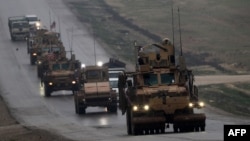The United States withdrawal from Syria is getting underway but, at least for now, it does not involve some 2,000 U.S. troops on the ground, who are aiding in the fight against the Islamic State terror group.
“Equipment, not troops,” a defense official told VOA Friday, describing the initial stages of the pull-out.
The Pentagon first gave word of the start of the withdrawal late Thursday.In a statement, it said the U.S.-led Operation Inherent Resolve “has begun the process of our deliberate withdrawal from Syria.”
“Out of concern for operational security, we will not discuss specific timelines, locations or troops movements,” the statement added.
Witnesses on the ground told the British-based Syrian Observatory for Human Rights they saw 10 armored vehicles, and other equipment, roll out from a U.S. base in the al-Rmelan area of al-Hasaka province and head toward neighboring Iraq.
But shortly after, other witnesses on the ground in Syria reported seeing an influx of Western troops and equipment to parts of Aleppo province in northern Syria.
As part of the influx, they described seeing "a column of about 150 vehicles carrying armored vehicles, military, and logistical equipment," the observatory said.
The reports could not be independently confirmed.But another source close to Kurdish military officials in Syria told VOA it appeared the U.S. military is in the process of relocating equipment and personnel within Syria.
The U.S. decision to withdraw its forces from Syria, first announced by President Donald Trump last month, has caused confusion among. U.S. allies and partners in the fight against Islamic State militants.
Initial indications from the White House were that U.S. forces would be withdrawn from Syria in 30 days.But that timeframe has since been extended several times.
Most recently, both the Pentagon and U.S. National Security Adviser John Bolton have said there is no deadline for U.S. troops in Syria to return home.
“OIR [Operation Inherent Resolve] has an approved framework for the withdrawal of forces from Syria, and is now engaged in executing that withdrawal,” Pentagon spokesman Commander Sean Robertson, said earlier this week. “That framework is conditions-based and will not subject troop withdrawal to an arbitrary timeline.”
“The framework will be influenced by a number of factors, including weather,” he added.
The U.S.-backed Syrian Democratic Forces (SDF) are still fighting the last remnants of the Islamic State’s self-declared caliphate in Syria, having pushed IS fighters out of their strong-hold of Hajin, in Syria’s Middle Euphrates River valley, and liberating a couple of other nearby towns in the past couple of weeks.
But even as the SDF advance, there are growing concerns about their safety. Much of the force is made up of Kurdish fighters, who are also part of the Syrian Kurdish People's Protection Units or YPG, which has been linked to the PKK, a Kurdish terror group that has waged a decades-long insurgency in southeastern Turkey.
Turkey’s Defense Minister Hulusi Akar visited Turkish troops along the Syrian border Friday, and vowed to eliminate the Kurdish forces in Syria.
"When the time and place comes, the terrorists here will be buried in the ditches they have dug, as was done in previous operations," Akar told the Turkish troops.
"Important preparations and planning have been made in connection with this,” he added. “Our preparations are continuing intensively."
But U.S. National Security Advisor John Bolton said Friday during a radio interview that talks are ongoing between the U.S. military and Turkey regarding the Kurdish forces that have battled IS.
"What we're still pursuing in these military to military conversations are assurances and protocols and procedures so that everybody feels comfortable with how this is going to happen,” said Bolton. “We're hoping those discussions, which will continue next week, will produce results that are acceptable on both sides.”
Earlier this week, Bolton called security assurances for the U.S.-backed Kurdish forces a necessary condition for the withdrawal of U.S. forces from Syria.The comments angered Turkish President Recep Tayyip Erdogan, who then refused to meet with Bolton during a visit to Turkey.

